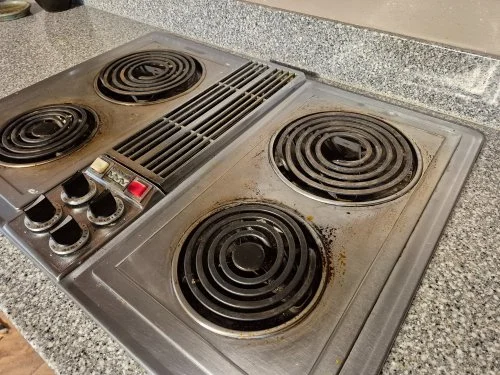Kitchen Appliance Safety and Inspections: Why Professional Evaluations are Important
You expect your kitchen appliances to just work, but beneath their familiar surfaces could be potential hazards that may threaten your family's safety. From carbon monoxide poisoning to electrical fires to water damage, kitchen appliances present unique risks that most homeowners don’t like to consider until something goes wrong. This is even more important during holidays when you are taxing your appliances by providing for family and friends.
A 1970s model JennAir electric modular cooktop with downdraft fan.
Carbon Monoxide and Smoke Detectors Gas-fired appliances such as ranges, cook tops, and ovens can produce deadly carbon monoxide when they're not burning fuel completely, when their venting systems fail, or when they weren’t installed properly. This colorless, odorless gas kills hundreds of people annually and sickens even more. Having a functional, properly placed carbon monoxide monitor in your home can help protect your family. While you are at it, check your smoke detectors!
Electrical Outlets Electrical connections in kitchens face unique challenges from heat, moisture, and food (such as oil and grease) that can cause fires and electrocution hazards. Appliances that aren't properly grounded or protected by Ground Fault Circuit Interrupters (GFCI) circuits create serious shock risks, especially when water is present. Overloaded circuits powering multiple high-demand appliances can overheat and ignite surrounding materials.
Water Works Plumbing connections to sinks, dishwashers, ice makers, and garbage disposals are common leak sources. Improper installations from inadequate connections can fail over time, flooding cabinets and floors with water that promotes mold growth.
Installation Matters Many appliances require specific installation requirements that affect their safety and performance. Range hoods must vent properly to remove combustion gases. Dishwashers need proper air gaps to prevent contaminated water from backing into your drinking water supply. Garbage disposals require specific electrical and plumbing connections to operate safely.
Before appliance problems become safety hazards, have them checked by a licensed home inspector who can also verify proper electrical protection, and check the installation quality.
With professional inspection and proper maintenance, your kitchen can continue serving as the heart of your home where families gather safely to create meals and memories together.

